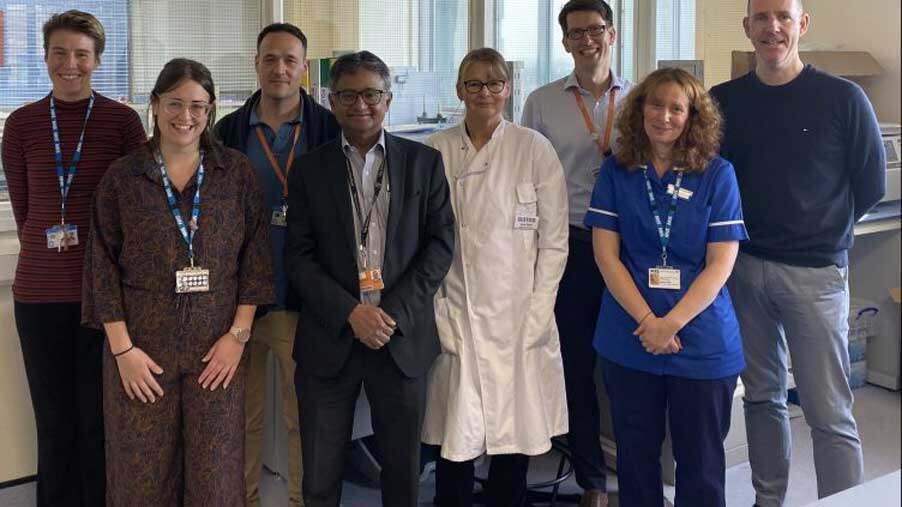First-of-its-kind trial hopes to improve survival rates for advanced bladder cancer by matching treatments to known genetic risk markers.


- Researchers will test if bladder cancer treatments can be personalised to different genetic subtypes of the disease rather than through a ‘one-size fits all approach’
- The trial could fundamentally change the way bladder cancers are treated, improve survival rates and boost quality of life following surgery
- Muscle-bladder bladder is one of the most common and expensive-to-treat cancers
A major new trial aiming to transform outcomes for patients with advanced bladder cancer by matching treatments to genetic information found within their individual cancer has been launched today (8 November 2023).
The trial, known as GUSTO, will seek to establish if treatments for muscle-invasive bladder cancer, one of the most common and most expensive-to-treat cancers, can be tailored to different genetic subtypes known to cause the disease.
Current standard treatments for patients with the advanced cancer of the bladder wall involve chemotherapy before or after surgery to remove the bladder. This approach is then combined with other treatments such as radiotherapy.
Until now, it has not been possible to say how individuals will respond to this treatment. However, new research suggests that different genetic causes of bladder cancers may respond differently to different treatments – meaning some patients may respond best to chemotherapy while others do not respond as well to this treatment.
Other subtypes of the cancer may respond better to immunotherapy and so need this treatment alone or as a boost to chemotherapy. Finally, some cancers do not respond to either chemotherapy or immunotherapy and so need immediate surgery.
The trial, which is jointly funded by a Medical Research Council (MRC) and National Institute for Health and Care Research (NIHR) partnership, will be the first to test this in a clinical trial.
Researchers hope the study will improve survival rates, and boost quality of life for patients following surgery.
Professor James Catto, Honorary Consultant Urological Surgeon at Sheffield Teaching Hospitals NHS Foundation Trust and Professor of Urology at the University of Sheffield and chief investigator of the study, said: “We are very excited to be launching this new study, which has been in development for the best part of four years. Recent advances in understanding genetic causes that lead to bladder cancer have opened new possibilities in how we can better treat this awful disease. Survival rates for the disease also remain unchanged.
“By tailoring treatments to genetic markers of the disease, we hope to help patients get the right treatment for their specific disease and boost quality of life following surgery.”
Professor Syed Hussain, Professor and Consultant in Medical Oncology at Sheffield Teaching Hospitals and the University of Sheffield and lead oncologist for the study, said: “Combined treatments currently have the best cure rates, but they also have the most complications, are expensive and affect a person’s well-being for many months.
“Recent advances have suggested that treating all individual patients as though they have the same type of bladder cancer, with everyone receiving the same treatment schedules in the same way, may not be best for individual patients. GUSTO trial stratifies treatments for patients based on subtypes of bladder cancer.
“This is an exciting trial that may help to improve the outcome for our patients in coming years and change the landscape for patients with muscle invasive bladder cancer. We are very much looking forward to working with our partner sites on this hugely exciting study.”
The trial is led by Sheffield Teaching Hospitals NHS Foundation Trust and the Leeds Cancer Research UK Clinical Trials Unit at the University of Leeds in partnership with the University of Sheffield.
David Cairns, Professor of Clinical Trials Research at Leeds Cancer Research UK Clinical Trials Unit and the University of Leeds, said: “The vision of the Leeds Cancer Research UK CTU is to improve the length and quality of survival for cancer patients on a worldwide scale. Our strategy to do this is to ensure that we build evidence to identify the correct treatment, for the correct duration, for the correct patient. GUSTO, an important collaboration between the great Yorkshire cities of Sheffield and Leeds, is a trial reflecting our strategy, using biological tests and modern multi-modal therapeutic interventions in bladder cancer.”
Allen Knight, patient Trustee at Action Bladder Cancer UK who helped design the study, said: “For the first time, GUSTO will let doctors diagnose the subtypes of muscle invasive bladder cancer, enabling them to tailor treatment to each individual patient, rather than the current ‘one size fits all’ approach. This has the potential to give the correct treatment more quickly and avoid unnecessary treatment, thus radically improving patients’ quality of life and saving many lives.”
Muscle-invasive bladder cancer is an advanced type of cancer that occurs when the cancer invades the muscle layer of the bladder. As soon as this happens, the likelihood of the cancer spreading to other organs is much higher.
During the first part of the study, the team of researchers will look to establish if genetic profiling from tumour samples can be turned around fast enough so as not to delay treatment. This element has been made possible thanks to the laboratory medicine teams at Sheffield Teaching Hospitals and the University of Sheffield.
The team will also work with an American laboratory with the ‘next generation’ facilities to undertake the complex processing needed to measure the RNA levels of 200 genes and identify individual cancer subtypes.
A total of 320 patients will be involved in the study, which is set to run in up to 20 UK sites. Half of the patients in the study will receive treatments based on their genetic sub-type, whilst the other half will receive the current standard treatment.



































